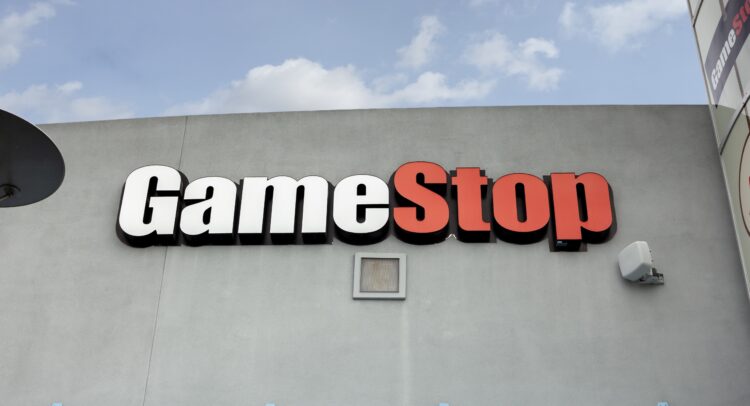Looking to invest in meme stocks for fun and profits? Fun is fine, but I want you to save your money for more sensible opportunities. GameStop (NYSE:GME) isn’t a fundamentally high-conviction business, and despite (or perhaps because of) a famous meme lord’s obsession with GameStop, I am 100% bearish on GME stock.
GameStop operates a chain of stores where people can purchase physical copies of video games. GameStop also has an online presence, but many video game players download or stream their games through sources other than GameStop.
Sure, GameStop stock kicked off the meme-stock trend in 2021, and a few lucky folks made money from that. Now, in 2024, there’s a meme-stock sequel in progress, and the ending could be just as bad as it was the last time. Once we get into the financial issues with GameStop, as well as the legal concerns surrounding meme-stock trading, you’ll hopefully be persuaded to find better investment opportunities (of which there are plenty).
GameStop and Alleged Manipulation Concerns
Keith Gill, also known on social media as “Roaring Kitty,” is well-known for leading the meme-stock brigade in 2021. He was silent on social media for several years but then resurfaced in mid-May. This spurred a massive melt-up in GME stock, but then the stock crashed just a few days later.
I wish I could say that the story ended there, but it didn’t. Yesterday, Gill announced his first YouTube livestream in a long time, which was supposed to start at 12:00 p.m. Eastern time on Friday.
Gill didn’t show up for his scheduled livestream until about half an hour later. He looked “stoned,” with his unkempt long hair and sunglasses worn indoors. Gill’s speech and mannerisms also gave off a “high” vibe.
I’ll just go ahead and say it – Gill’s livestream was practically unwatchable and was basically a “nothing burger.” It’s no surprise at all, then, that GME stock didn’t have its moonshot moment that some traders undoubtedly hoped it would.

Even beyond the seemingly “stoned” persona, questions are circulating about Gill’s ethics as an alleged market manipulator. After all, regulators sometimes don’t like it when a public figure pounds the table (figuratively speaking) on a particular asset.
You may have heard about discussions of potential market manipulation after reports circulated that brokerage E*Trade might remove Gill from its platform. Furthermore, it’s a major concern that Gill reportedly purchased a large quantity of GameStop call options before making his grand return to social media last month.
Now, I’m not going to use the word “manipulation” in regard to Gill, like Citron Research and Oakoff Investments did. Rather, my point here is to prompt prospective investors to ask questions. Do you really want to wager your capital on GameStop shares when there might allegedly be unethical/illegal shenanigans going on?
GameStop Stock: Don’t Fall Into the Trap
Speaking of Oakoff Investments, the firm recently warned, “I urge you not to fall into this trap by buying GME on this upswing.” Why is it a trap? According to Oakoff Investments, the “biggest reason to avoid GameStop is its fundamentals, which continue to leave much to be desired.”
I concur 100%. On Friday morning, just a few hours before Gill’s scheduled livestream, GameStop unexpectedly released its financial results for the first quarter of Fiscal Year 2024, which ended on May 4. In a bizarre move (or non-move), GameStop chose not to hold a quarterly investor conference call. That’s certainly not a good sign. Did the management think that Gill’s livestream would serve as a proxy conference call?
Speaking of bad signs, GameStop announced its plans to sell up to 75 million shares in an “at-the-market” offering. That’s in addition to the offering of 45 million shares that GameStop announced on May 17. Of course, these large-scale stock sales raise concerns about share-value dilution. Plus, they should prompt investors to wonder whether a financially stable business would feel the need to print and sell so many shares.
Finally, let’s get to the dirty details of GameStop’s Fiscal Q1-2024 results. The company’s revenue plunged 28.7% year-over-year to $882 million. Additionally, GameStop remains unprofitable, having lost $0.12 per share in the quarter versus the consensus estimate of an adjusted loss of $0.09 per share. Those statistics certainly suggest, to me at least, that GME stock is indeed a “trap” to avoid.
Is GameStop Stock a Buy, According to Analysts?
On TipRanks, GME comes in as a Moderate Sell based on one Sell rating assigned by analysts in the past three months. GME stock’s price target of $13.50 implies 51.5% downside potential.

Conclusion: Should You Consider GameStop Stock?
It’s fine to have fun in life, but wealth preservation is a serious matter. Hence, if you’re thinking about taking a share position in GameStop now, be sure to look at the company’s fundamentals first. Then, you’ll probably reconsider your investment.
While you’re conducting your due diligence, you might want to think about the possible ethical and legal implications of the meme-stock trade. With all of that in mind, I view GME stock as highly risky and am not considering buying it.



















